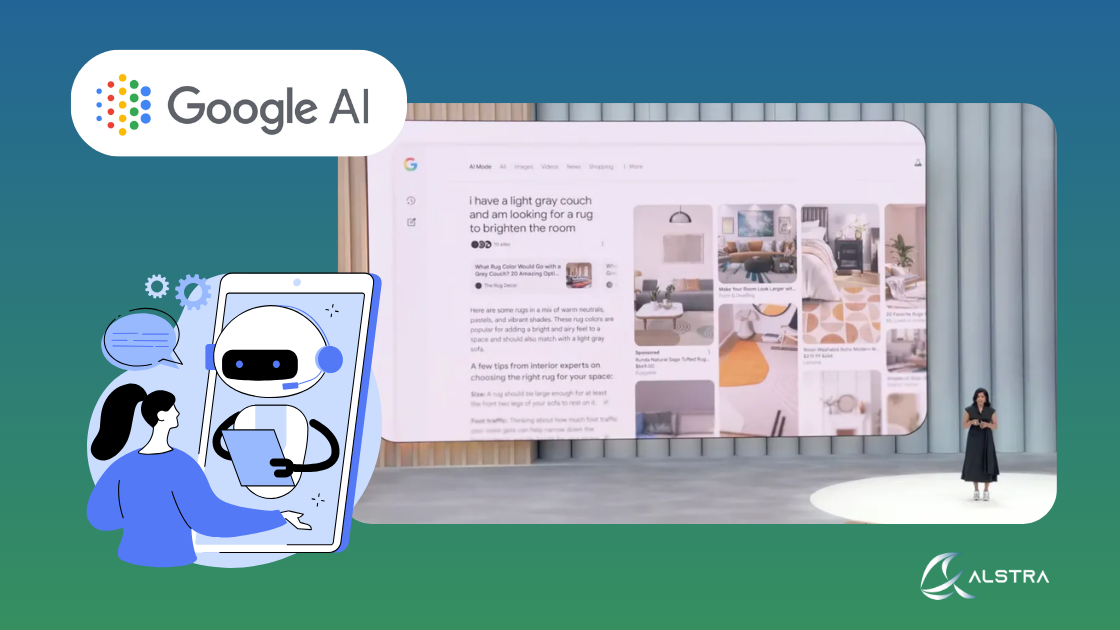Google has fundamentally transformed its search platform in May 2025 by integrating advertising directly into AI-powered search features. Although these developments are now under way in the United States, the implications for Canadian companies are major—what starts in the US usually spreads to other markets in months.
The tech giant has introduced AI Overviews and AI Mode, two AI-powered features that don’t just change how people search, but completely reimagine the search experience. More importantly for businesses, Google is now running ads right inside these artificial intelligence responses, generating novel advertising prospects while maybe upsetting established search traffic patterns.
The New Google AI Search Landscape
Google’s AI search evolution centers on two key features that are reshaping user behavior. AI Overviews provide AI-generated summaries at the top of search results, often answering questions directly without requiring users to click through to original sources. Originally found on mobile devices, this capability is currently spreading to desktop users.
AI Mode represents an even more significant shift, offering a chatbot-like interface where users receive comprehensive summaries alongside relevant website links. Google CEO Sundar Pichai described this as a “total reimagining” of Search, and the numbers support this claim—AI Mode is now available to all users in the United States.
The advanced capabilities include ‘Deep Search’ functionality that conducts thorough investigations through multiple simultaneous queries, virtual ‘try it on’ options for apparel shopping, and increasingly personalized search experiences that leverage user history. These tools mark a basic change from conventional keyword-based search to conversational, context-aware interactions.
Advertising Integration: The Game Changer
Google’s strategic move to monetize AI search features through targeted advertising integration marks a pivotal moment for digital marketing. Ads are now appearing within both AI Overviews and AI Mode, clearly marked as “Sponsored” but integrated seamlessly into AI-generated responses.
The advertising approach is sophisticated and context-driven. Ads appear when they’re relevant to both the query and the AI response, creating what Google describes as more natural advertising experiences. For instance, when users ask AI Mode for advice on creating a website, they receive comprehensive guidance but may also see helpful ads for website creation tools.
Dan Taylor, VP of global ads at Google, noted that queries within AI Mode tend to be twice as long as traditional searches and more exploratory in nature. This shift “opens up new opportunities to discover brands where advertisers might not necessarily have been in the conversation before,” fundamentally expanding the advertising landscape.
Currently, these advertising features are primarily available in the United States, with ads in AI Overviews on desktop now available to all U.S. users. However, Google plans to introduce advertisements in English-language AI Overviews in “select countries” later this year, suggesting Canadian businesses should prepare for these changes sooner rather than later.
The Local Business Impact: By the Numbers
A comprehensive study by Local Falcon provides crucial insights for Canadian businesses preparing for these changes. The research analyzed 60,000 real-world simulations across 4,423 businesses in 20 countries, revealing AI Overviews appear in 40.2% of local business searches.
Service-based businesses face the most significant impact, with AI Overviews appearing most frequently for specific sectors. Window cleaning services see AI Overviews in 65.0% of searches, followed by carpet cleaning services at 64.6%. Personal injury attorneys (62.1%), wedding photographers (61.8%), and pest control services (60.7%) also experience high AI Overview appearance rates.
These numbers reflect the kinds of local companies where customers usually ask informational questions about processes, pricing, and service details before making buying decisions; they are not random. The query intent dramatically influences AI Overview appearances: informational queries trigger AI Overviews 58.3% of the time, while commercial queries only see them 17.2% of the time.
David Hunter, CEO of Local Falcon, emphasized the significance of these changes: “This is one of the most significant updates to local search in years. ChatGPT and Google AI Overviews are changing the rules—and most businesses don’t even realize it yet.”
Publisher and Traffic Concerns
The broader implications extend beyond local businesses to publishers and content creators. Publishers such as The Sun have experienced a 40% drop in global unique monthly users since AI Overviews began rolling out more widely. Industry estimates suggest AI Overviews could cause a 25% drop in traffic, resulting in an annual industry-wide revenue loss of up to $2 billion.
The concern centers on source attribution—when AI generates summaries without clear source attribution, ranking first in search results becomes less valuable. The News/Media Alliance, representing over 2,000 media organizations, has called Google’s AI Mode “theft” and urged the US Department of Justice to launch an antitrust investigation.
Strategic Adaptation for Canadian Businesses
Notwithstanding these difficulties, companies can be proactive to keep visible in the changing search scene. The Local Falcon research offers particular ideas for adjusting to search patterns driven by artificial intelligence.
Location-Focused Content Strategy becomes crucial for local businesses. Emphasizing location names in content can potentially avoid appearing in AI Overviews and instead trigger a local pack. Creating location-specific pages for each service area helps establish local relevance and authority.
Intent-Based Optimization requires shifting focus toward commercial and navigational queries, which show lower AI Overview appearance rates. Businesses should create locally-relevant content that answers common questions customers ask before purchase, while optimizing Google Business Profiles to capture local pack placements for high-intent searches.
For businesses in categories with high AI Overview exposure, Local Authority Building becomes essential. This involves creating comprehensive local service guides, developing location-specific expertise content that Google may cite as authoritative sources, and producing multimedia content like videos showcasing local services.
Traffic Diversification Strategies are no longer optional but necessary for business resilience. Businesses should widen local marketing channels outside of organic search, create direct customer relationship strategies via email and local social media, and investigate strategic local paid search campaigns for high-value keywords where AI Overviews show often as dependency on traditional search traffic may drop.
The Competitive Landscape and Future Outlook
Google’s AI search advertising integration should be viewed within the broader context of industry competition and massive AI investments. Google is committing over $75 billion to AI infrastructure and expanding cloud capacity this year, protecting and growing its approximately $265 billion in annual ad revenue.
The competitive pressure is evident as Perplexity introduced ads last November, Microsoft briefly tested ads in its Copilot chatbot, and OpenAI has mentioned potentially implementing an ad-supported model to complement subscription services.
Google is also positioning itself as a champion of small businesses through initiatives like “50 Stories, 50 States,” showcasing how its Gemini AI helps small businesses streamline operations and improve efficiency. This narrative suggests Google recognizes the need to support businesses adapting to these fundamental changes.
Preparing for the Canadian Rollout
While these features are currently limited to the United States, Canadian businesses should begin preparing now. Google’s historical pattern shows major search updates typically reach Canadian markets within 3-6 months of US launches, especially for English-language features.
The data and insights from early US implementations provide Canadian businesses with a unique advantage—the ability to prepare strategies before widespread adoption. Especially in cleaning, legal, photography, and pest control industries, service-based companies should give developing AI-optimized content strategies and local authority building initiatives top priority.
For businesses in sectors showing lower AI Overview rates, the opportunity exists to maintain traditional search visibility while competitors navigate AI-driven changes. However, all businesses should begin diversifying traffic sources and developing direct customer relationship strategies to reduce dependency on organic search traffic.
For businesses ready to try out new ad forms, the inclusion of advertising into AI search tools also offers fresh prospects. Early adoption of AI-integrated advertising could offer competitive benefits as these capabilities reach Canadian markets.
Google’s May 2025 updates represent more than incremental changes—they signal a fundamental transformation in how people discover and interact with businesses online. Canadian companies that understand these patterns and adapt their strategies accordingly will be best positioned to maintain search visibility and continue attracting customers in this rapidly evolving digital environment.
Stay Ahead of the AI Search Revolution
Businesses need professional advice to properly negotiate the changes that Google’s AI search tools are ready to bring about in the Canadian digital terrain. At Alstra Solutions, we specialize in helping Canadian businesses adapt to evolving search technologies through comprehensive SEO strategies, Google Ads optimization, and custom website solutions designed for the AI-driven future.
Don’t wait until these changes impact your business—contact our Toronto-based team today to develop a strategy that positions your business for success in Google’s new AI search environment. From traffic diversification to local authority building, we’ll help you maintain visibility and grow your customer base as search continues to evolve.

